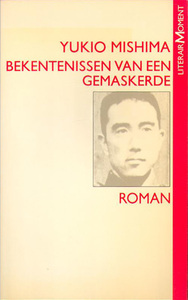Take a photo of a barcode or cover
dark
sad
medium-paced
Plot or Character Driven:
Character
Strong character development:
Complicated
Loveable characters:
Complicated
Diverse cast of characters:
No
Flaws of characters a main focus:
Yes
dark
emotional
reflective
medium-paced
Plot or Character Driven:
Character
Strong character development:
Complicated
Loveable characters:
Yes
Diverse cast of characters:
Yes
Flaws of characters a main focus:
Complicated
dark
emotional
reflective
sad
tense
slow-paced
Plot or Character Driven:
Character
Strong character development:
Complicated
Loveable characters:
Complicated
Diverse cast of characters:
No
Flaws of characters a main focus:
Yes
Coming to terms with your sexual orientation can be as challenging as coming out. Confessions of A Mask is about Kochan’s struggle to blatantly accept that he’s gay. It’s proven more difficult as this was set during World War II, a time in which discussions of homosexuality wasn’t accepted or even spoken of. Additionally, this period was all about being machismo, which Kochan was not.
This was my third Mishima novel and I’m glad that it’s my third and not my first. It’s honestly quite dull in comparison to Life For Sale and Star. I understand that this novel was more character-driven, but I believe that Mishima could have cut 1/4 of the book and we’d still understand fully the mindset and viewpoint of Kochan.
This may not be my favorite Mishima novel, but I still love the way he wrote the protagonist. As always, Mishima writes the most honest train of thought no matter how dark it can be. Every Mishima novel would have you think, “no person can ever think like that, how unrealistic!” But how do we know what really goes on in a person’s head, right? There’s Kochan’s odd obsession with death and St. Sebastian, which made me think of how our first “crush” would somehow mold who we’re attracted to. Then there’s Kochan’s dark possessiveness over Omi that can be unsettling but doesn’t come off as unrealistic.
Another thing I like about how Mishima writes characters is that they’re walking contradictions and their thought process is complex. For me that’s the most realistic way of depicting a person. Kochan has multiple layers of understanding who he is, his attraction towards men, and his attraction towards women. Especially once Sonoko is introduced, readers will see how complex his thoughts are.
The real talent of Mishima as a writer is seen with how the tone of Kochan’s thoughts is confident, but upon analyzing readers can see he’s actually in denial, confused and doubtful.
The ending of this has Kochan subtly accepting his homosexuality without actually addressing it. For me I actually found this as a great way to end the novel. But overall, this novel was just alright - dull at some points, fascinating in others.
This was my third Mishima novel and I’m glad that it’s my third and not my first. It’s honestly quite dull in comparison to Life For Sale and Star. I understand that this novel was more character-driven, but I believe that Mishima could have cut 1/4 of the book and we’d still understand fully the mindset and viewpoint of Kochan.
This may not be my favorite Mishima novel, but I still love the way he wrote the protagonist. As always, Mishima writes the most honest train of thought no matter how dark it can be. Every Mishima novel would have you think, “no person can ever think like that, how unrealistic!” But how do we know what really goes on in a person’s head, right? There’s Kochan’s odd obsession with death and St. Sebastian, which made me think of how our first “crush” would somehow mold who we’re attracted to. Then there’s Kochan’s dark possessiveness over Omi that can be unsettling but doesn’t come off as unrealistic.
Another thing I like about how Mishima writes characters is that they’re walking contradictions and their thought process is complex. For me that’s the most realistic way of depicting a person. Kochan has multiple layers of understanding who he is, his attraction towards men, and his attraction towards women. Especially once Sonoko is introduced, readers will see how complex his thoughts are.
The real talent of Mishima as a writer is seen with how the tone of Kochan’s thoughts is confident, but upon analyzing readers can see he’s actually in denial, confused and doubtful.
The ending of this has Kochan subtly accepting his homosexuality without actually addressing it. For me I actually found this as a great way to end the novel. But overall, this novel was just alright - dull at some points, fascinating in others.
dark
emotional
reflective
sad
medium-paced
Plot or Character Driven:
Character
Strong character development:
No
Loveable characters:
Complicated
Diverse cast of characters:
No
Flaws of characters a main focus:
Yes
challenging
emotional
reflective
medium-paced
Plot or Character Driven:
Character
Strong character development:
Yes
Loveable characters:
Complicated
Diverse cast of characters:
Complicated
Flaws of characters a main focus:
Yes
Graphic: Suicide, Suicide attempt
reflective
medium-paced
Plot or Character Driven:
A mix
Strong character development:
Complicated
Loveable characters:
Yes
Diverse cast of characters:
Yes
Flaws of characters a main focus:
Complicated
dark
reflective
sad
Plot or Character Driven:
Character
Strong character development:
Complicated
Loveable characters:
No
Flaws of characters a main focus:
Yes
challenging
emotional
inspiring
medium-paced
dark
emotional
inspiring
mysterious
reflective
sad
tense
slow-paced
Plot or Character Driven:
Character
Strong character development:
Complicated
Loveable characters:
Yes
Diverse cast of characters:
Complicated
Flaws of characters a main focus:
Yes
dark
reflective
fast-paced
Plot or Character Driven:
Character
Strong character development:
Complicated
Loveable characters:
Complicated
Diverse cast of characters:
Complicated
Flaws of characters a main focus:
Complicated




